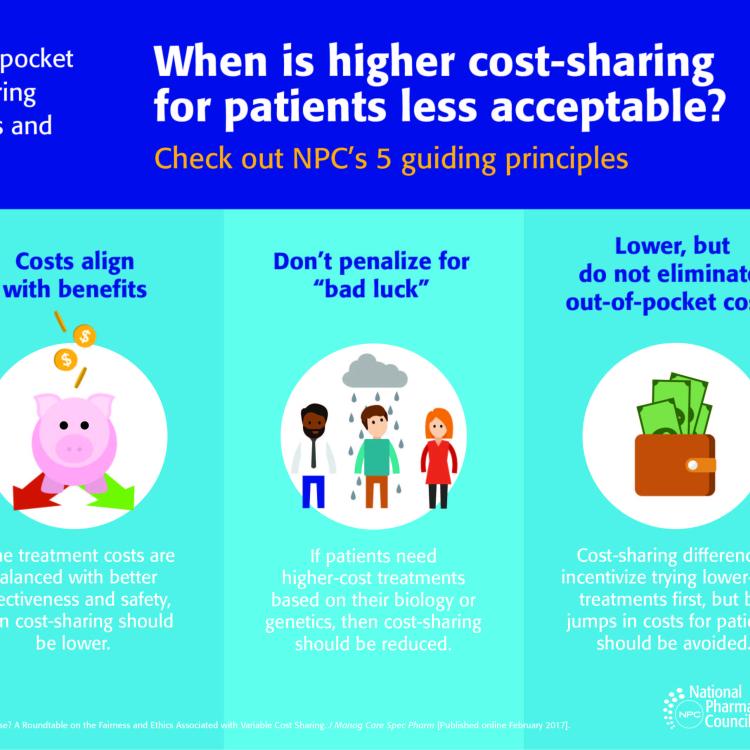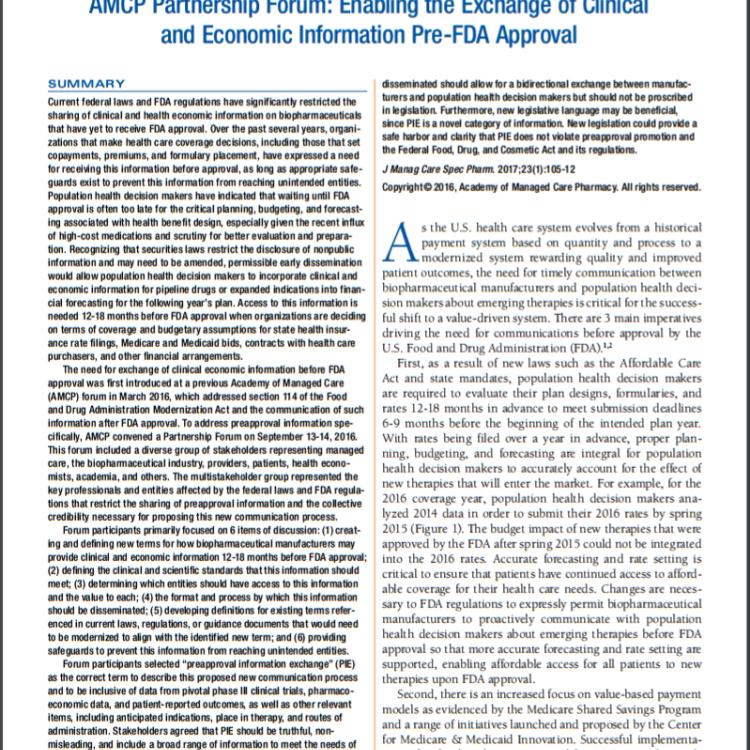Resources
The National Pharmaceutical Council (NPC) is a health policy research organization dedicated to the advancement of good evidence and science, and to fostering an environment in the United States that supports medical innovation.
Filter by:
Topic
Topic
- Accountable Care Organizations
- Alternative Payment Models
- Biopharmaceutical Innovation
- Bundled Payments
- Clinical Pathways
- Decision Frameworks
- Elements of Value
- Evidence for Decision Making
- Formulary/Benefit Design
- Formulary Development
- Good Practices for Evidence
- Health Care Quality Measures
- Health Spending
- Health Spend Management
- High-Deductible Health Plans
- Impact on Outcome & Spending
- Individual Treatment Effects & Personalized Access
- IRA Implementation
- Low-Value Care
- Pandemic Response
- Patient Cost Sharing
- Paying for Cures
- Pharmacy Benefit Managers (PBMs)
- Policy & Regulatory Barriers
- Real-World Data
- Real-World Evidence
- Regulatory Barriers & Challenges
- Understanding Health Spending
- Utilization Management & Step Therapy
- Value-Based Contracts
- Value-Based Insurance Design
- Value Assessment
- Value Assessment Frameworks
- Value Assessment Methods
Resource Type
Display Only
Showing 1216 Results
Workshop Looks “Under the Hood” of Value Assessment Frameworks
During the Feb. 27 interactive workshop, “Understanding the Strengths and Limitations of Value Assessment Frameworks,” hosted by the National Pharmaceutical Council and PhRMA, health care…
The Evolution of Value Assessment
A Health Affairs Blog post by NPC Chief Science Officer Robert Dubois, MD, PhD, and Vice President for Health Services Research Kimberly Westrich, MA, identified several key considerations that could…
Value Assessment Frameworks: Are They Up To The Challenge?
In this article published on the Health Affairs Blog, NPC researchers Dr. Robert Dubois and Kimberly Westrich ask: Are value assessment frameworks ready to compare the health and economic impacts of…
Concerns Around Budget Impact Thresholds: Not All Drugs Are The Same
A study published in Value in Health explores the potential impact of using budget thresholds as budget caps (e.g., cannot spend more than a set dollar amount) for individual drugs.
NPC President Dan Leonard Offers Perspectives on Health Reform
In a commentary recently published in The American Journal of Pharmacy Benefits, NPC President Dan Leonard offered 10 key considerations for stakeholders as they navigate health reform discussions.
National Pharmaceutical Council 2016 Annual Report
The National Pharmaceutical Council is a health policy research organization dedicated to the advancement of good evidence and science, and to fostering an environment in the United States that…
How Is the Multiple Sclerosis Community Engaging on Value Assessment?
NPC President Dan Leonard caught up this week for a Q&A with Lisa Skutnik, President of the MS Coalition, to discuss how the value of multiple sclerosis (MS) treatments is being assessed,…
Comparison of Value Framework Assessments for Multiple Myeloma
In this NPC-funded study conducted by the Lewin Group, four existing value assessment frameworks were compared head to head to understand how each framework would approach the same condition,…
When Is It Less Acceptable for Patients to Face Higher Cost-Sharing?
A new study explores when variation in consumer cost-sharing makes sense, and when it is less acceptable for patients with the same or similar conditions to have different out-of-pocket costs, as…
Does a One Size Fits All Cost-Sharing Approach Incentivize Appropriate Medication Use?
Patients contribute to health care costs through out-of-pocket expenses, like copays and coinsurance. These cost-sharing mechanisms are intended to help payers manage costs and…
Does a One-Size-Fits-All Cost-Sharing Approach Incentivize Appropriate Medication Use? A Roundtable on the Fairness and Ethics Associated with Variable Cost Sharing
A study convened an expert roundtable of patient, payer, and employer representatives to review four case studies to understand when it would be more (or less) acceptable to require patients…
Missed Signals in Cancer Care: Strategies to Address Quality Measure Gaps
When it comes to designing accountable care models, the dramatically varied needs and preferences of patients with cancer can confound quality measurement, especially when compounded by increasingly…
Improving Oncology Quality Measurement in Accountable Care: Filling Gaps with Cross-Cutting Measures
According to a study, gaps in the quality measures used by accountable care programs to assess cancer care may obscure problems in care delivery and lead to missed opportunities for improvement of…
FDA Releases Guidance Documents on Communicating Clinical and Economic Information
The Food and Drug Administration (FDA) this week has released a series of draft guidance documents that clarify how and when different types of clinical and economic information may be communicated.
Pharmacy Benefits: Super-sized, Minimized or Right-Sized?
In the December issue of Employee Benefit News, NPC Vice President of Comparative Effectiveness Research Jennifer Graff, PharmD, outlines a framework for the consideration of treatment flexibility in…
Pre-Approval Information Exchange Can Help Improve Population Health Decision-Making
Health care stakeholders, including NPC, gathered in September for a meeting hosted by the Academy of Managed Care Pharmacy to discuss potential ways to improve the exchange of information between…















